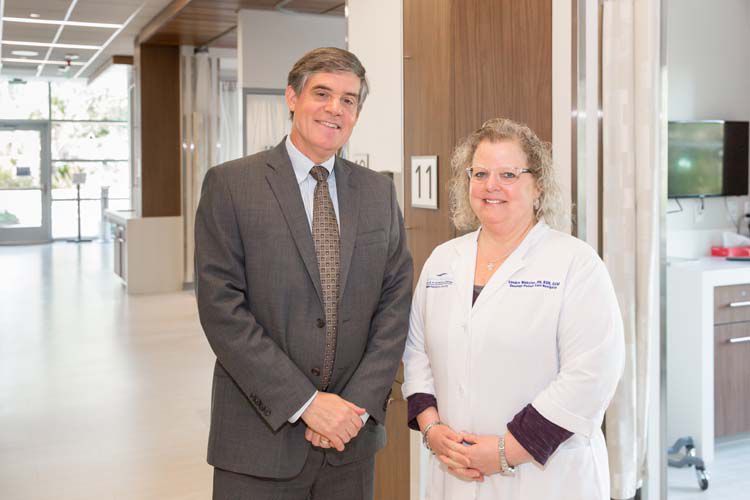
Dr. James Grichnik’s enthusiasm about bringing genetic counseling and testing for cancer to Vero Beach, along with newly developed genetic-based cancer treatments, is palpable.
“I really do view this as an exciting, cool time. We are now beginning to see patients being cured in ways that I couldn’t have initially imagined,” exclaims the youthful-looking Grichnik, who ignores the constant beeping of his cellphone and focuses, instead, on this latest innovation in cancer research and treatment.
According to the American Cancer Society, “Advances in genetics and molecular biology have improved our knowledge of the inner workings of cells and how cells can change during a person’s life to become cancer and how certain types of changes can build on inherited gene changes to speed up the development of cancer and how this information can help us better prevent and treat cancer.”
“Right now, a lot of the genetic counseling is based on what are the likely genes in your family, but we’re now moving more toward bigger panels where we look at essentially all the genes that might be associated with or that have a high risk for cancer,” says Grichnik, director of the Scully-Welsh Cancer Center at Indian River Medical Center.
Much of the technical terminology Grichnik tosses into each rapid-fire sentence – including terms such as “NRAS mutations, DNA repair pathways, V600E mutations, MEK and ERK molecules, proteins phosphorylating and CTLA4 molecules” – can be a little daunting to the layman.
Still, when Grichnik pauses and claims that, at least in theory, “we can sequence your DNA, find a mutation and give you a drug that melts your cancer,” that alphabet soup of tech talk starts to seem well worth comprehending.
“We [at Scully-Welsh] have access to all the FDA-approved drugs: the BRAF inhibitors and the MEK inhibitors; the PD1 inhibitors; the CTLA4 inhibitors. We’re using all of them right here.”
It is important to note that, despite rapid and dramatic progress, gene-centric approaches to fighting cancer are still in their infancy. There is no ironclad cure for cancer at Scully-Welsh or anyplace else. Not yet.
Still, Grichnik seems so intensely optimistic that it’s difficult not to get caught up in his excitement.
“Something on the order of 10 to 15 percent of cancers may very well be related to your genetics,” Grichnik explains. “What you inherited from mom or dad. Having knowledge of those mutations may help us in different ways to guide your care. If you’re at high risk for a particular cancer, we can increase surveillance, which might allow us to detect the cancer at a point where it’s much easier to cure.”
Grichnik quickly adds that not all cancer-causing gene mutations are inherited. Environmental factors including asbestos and various chemicals, exposure to ultra-violet light as well as cigarette smoking – which Grichnik blames for almost 50 percent of all cancer deaths – also cause mutations that result in cancer.
For the mechanics of how Vero area residents can get involved in this new approach to diagnosing cancer risk and treating cancer, Grichnik turns to registered nurse and cancer navigator Sandy Webster.
“Out in the community,” says Webster, “if a provider [primary care or specialist] is doing a family history assessment and is picking up that there might be some history of ovarian, breast, pancreatic, melanoma, colon [or other cancer], they can send a referral our way and ask us to do an assessment on the patient … to see whether they have an inherited risk.”
That family history is key and both Grichnik and Webster admit that can be difficult to come by. Relatives pass away, people move and those who were adopted and don’t know their birth parents start out with a definite disadvantage. Still, Webster says through the genetic cancer counseling sessions, as much information as possible is gathered and sent to Scully-Welsh’s partners at Duke Health.
“Duke,” Webster explains, “has a whole hereditary cancer clinic. They look at it. They talk between the counselors.
“Those counselors are Ph.D.’s and they’re certified in genetic counseling and everybody decides whether or not this person meets criteria after looking at the actual family history.” If those criteria are met, blood tests may be offered to provide the Duke and Scully-Welsh teams the DNA evidence needed to proceed further.
“Most insurances,” says Webster, “are jumping on board with this.” The cost for a counseling session is $200. The price for blood tests, if ordered, may vary, but many insurers are willing to pick that up.
Why? Because, as Grichnik states, the three-pronged approach of developing new drugs to eradicate cancerous mutations, blocking the pathways mutated genes use to spread and activating the body’s own immune system to better fight those mutations have all been showing impressive clinical study successes.
Genetic counseling for cancer is now being offered at the Scully-Welsh Cancer Center adjacent to the Indian River Medical Center. The number there, for those who want more information about this promising medical approach, is 772-226-3762.



